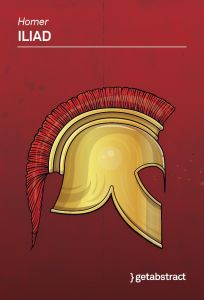
Iliad
- Epic
- Greek Antiquity
What It’s About
War Shatters Young Dreams
Homer’s Iliad tells a tale of war: war as the moment when men can become great, as the moment when men reveal their flaws, and as the tragedy of suffering and lives lost – individual, personal and pitiable. In Homer’s story, neither side is right or wrong, heroic or villainous. They’re both broadly of the same culture, share the same hopes and dreams, suffer the same fears and pains, and at another time could be sharing each other’s hospitality. The events that brought the Archaic Greeks to the walls of Troy aren’t entirely within the control of the human protagonists, and even when they attempt to halt the bloodshed, outside forces (the gods) conspire against them. And yet, this seemingly meaningless endeavor is what gives each warrior the chance to achieve immortality through his actions. Even today, when many see war as distant and far removed from their day-to-day lives, this central contradiction of human activity remains at the heart of life. Being human is about getting up and facing challenge. This tale of a strange war in a strange time continues to resonate across the centuries.
Summary
About the Author
Homer’s existence as a historical person continues to be the subject of debate. There is no reliable evidence of his existence – only the stuff of legends and tales. The creator of the Iliad and the Odyssey is supposed to have lived in the 8th century BC in Ionic Greece, a small arc of settlement along the coast of Asia Minor in what is modern-day Turkey. Most believe that he was blind, though it is also possible that this was just ascribed to him due to the character of the blind singer Democodos in the Odyssey. It is thought that Homer grew up in Smyrna (today’s Izmir) and died on the island of Ios. Legend has it that Homer performed his art mainly to entertain and edify common folks in port cities. Many of the modern philologists who believe that he existed as a real person are of the opinion that the poet-singer characters in his work can be understood as Homer’s self-portraits, and since all those characters were at the service of noblemen, it is likely that the poet, too, was practicing his art in the circles of the aristocratic classes. The more deeply researchers delved into his work, however, the more contradictions they encountered. Could it be that Homer as an historical person wasn’t even the author of those texts? It has long been considered likely that the author(s) harked back to a long narrative tradition, joining together individual episodes from other poets and singers. In any event, the Iliad is the first major literary work of the Western world that was handed down in written form. Homer’s two monumental epics of the Iliad and the Odyssey are the starting point of Greek and therefore European literature.








Comment on this summary